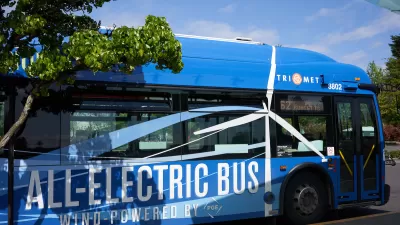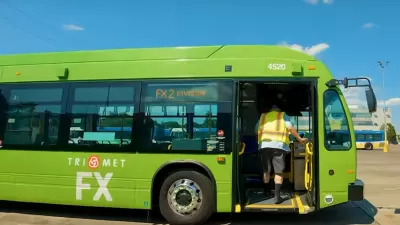A TriMet transit agency analysis has identified a culprit in the decline of transit ridership in Portland: gentrification and displacement.

Tom Mills and Madeline Steele, staff for Portland's TriMet transit agency, write a post for TransitCenter presenting evidence of a newly discovered correlation between rising housing costs and declining transit ridership.
TriMet is one of many transit systems around the country challenged by declining ridership. In Portland, such losses have already been blamed on "a diverse range of factors including changing employment levels and recession era fare increases and service cuts," according to Mills and Steele. But "TriMet’s analysis surfaced one driver of ridership loss that stood out among the rest: the impact of the economic displacement of low-income earners from inner city neighborhoods to first ring suburbs."
The article details the methodology of TriMet's analysis, and provides context on the recent history of the Portland housing market. Mills and Steele then state a key findings with potentially far-reaching implications for the trend of gentrification and urban revitalization in in other cities around the country. "We found substantial overlap between areas where real market home value increased and transit ridership decreased the most," they write, and "transit ridership grew in areas that saw minimal increases in real market home values."
To summarize: higher-wage earners moving into transit-rich neighborhoods use transit less that the lower-income residents who are departing these neighborhoods.
Hat tip to Angie Schmitt for sharing the article.
FULL STORY: In Portland, Economic Displacement May Be A Driver of Transit Ridership Loss

Planetizen Federal Action Tracker
A weekly monitor of how Trump’s orders and actions are impacting planners and planning in America.

San Francisco's School District Spent $105M To Build Affordable Housing for Teachers — And That's Just the Beginning
SFUSD joins a growing list of school districts using their land holdings to address housing affordability challenges faced by their own employees.

The Tiny, Adorable $7,000 Car Turning Japan Onto EVs
The single seat Mibot charges from a regular plug as quickly as an iPad, and is about half the price of an average EV.

Seattle's Plan for Adopting Driverless Cars
Equity, safety, accessibility and affordability are front of mind as the city prepares for robotaxis and other autonomous vehicles.

As Trump Phases Out FEMA, Is It Time to Flee the Floodplains?
With less federal funding available for disaster relief efforts, the need to relocate at-risk communities is more urgent than ever.

With Protected Lanes, 460% More People Commute by Bike
For those needing more ammo, more data proving what we already knew is here.
Urban Design for Planners 1: Software Tools
This six-course series explores essential urban design concepts using open source software and equips planners with the tools they need to participate fully in the urban design process.
Planning for Universal Design
Learn the tools for implementing Universal Design in planning regulations.
Smith Gee Studio
City of Charlotte
City of Camden Redevelopment Agency
City of Astoria
Transportation Research & Education Center (TREC) at Portland State University
US High Speed Rail Association
City of Camden Redevelopment Agency
Municipality of Princeton (NJ)





























